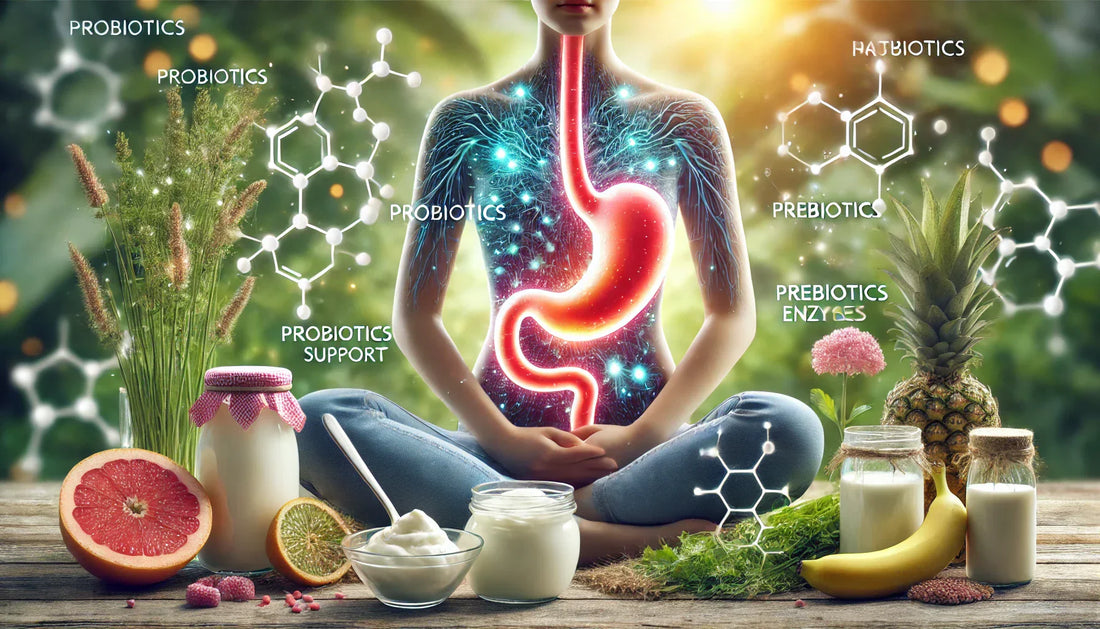
Fix Bloating and Gut Issues Naturally with Herbal Bee Gut Health Supplement
Share
Fix Bloating and Gut Issues Naturally with Herbal Bee Gut Health Supplement
If you’ve ever experienced uncomfortable bloating, sluggish digestion, or irregular bowel movements, you’re not alone. A healthy gut is essential for overall well-being, impacting digestion, immunity, mood, and energy levels. However, modern diets filled with processed foods, stress, and environmental toxins often disrupt gut health. That’s where Herbal Bee Gut Health Supplement comes in—an all-in-one solution designed to restore balance, relieve bloating, and support digestive health naturally.
Why Your Gut Deserves Extra Care
Your gut does more than just digest food—it houses trillions of bacteria that influence immune function, metabolism, and even mental health. A well-balanced gut promotes:
- Efficient digestion and nutrient absorption
- Stronger immunity
- Reduced bloating and gas
- Better mood regulation
When gut bacteria are imbalanced, symptoms such as bloating, constipation, stomach discomfort, food intolerances, and fatigue arise. A common cause of these issues is leaky gut syndrome, which occurs when the gut lining becomes damaged, allowing toxins and undigested food particles to enter the bloodstream. This can lead to inflammation and issues like chronic bloating, brain fog, skin problems, and autoimmune conditions [1].
The good news? Herbal Bee Gut Health Supplement is formulated with a powerful blend of vitamins, minerals, botanicals, and prebiotics to restore digestive function naturally.
How Herbal Bee Supports Digestion & Gut Repair
Essential Vitamins and Minerals for Gut Health
A nourished gut leads to better digestion and overall well-being. This supplement includes a blend of essential vitamins and minerals, each playing a vital role:
- Vitamin D supports gut microbiota balance [2].
- Zinc helps maintain gut lining integrity and immune function [3].
- Magnesium regulates bowel movements [4].
- B vitamins aid in food breakdown and energy production [5].
Potent Botanicals to Soothe and Restore
Nature offers powerful solutions to digestive distress. The Herbal Bee formula includes:
- Berberine HCl – Known for its antimicrobial properties, it helps regulate gut bacteria and aids in fat metabolism, supporting a flatter stomach [6,7].
- Resveratrol & Quercetin – These antioxidants combat inflammation and oxidative stress in the digestive tract [8,9].
- Star Anise & Garlic Bulb – Natural remedies that alleviate bloating and indigestion [10,11].
Prebiotics and Fiber for a Flourishing Gut Microbiome
A healthy gut thrives on good bacteria, which are fueled by prebiotics. This supplement contains:
- Chicory Root Inulin & Larch Arabinogalactan – Prebiotic fibers that nourish beneficial gut bacteria, enhancing digestion and nutrient absorption [12].
- Deglycyrrhizinated Licorice Root Extract (DGL) – Supports stomach lining health and relieves bloating, especially for those with sensitive digestion [13].
The Benefits You’ll Feel with Herbal Bee Gut Health Supplement
With consistent use, you can experience:
- Reduced bloating and digestive discomfort
- Regular bowel movements
- Stronger gut lining and reduced risk of leaky gut
- Enhanced nutrient absorption for more energy
- A balanced gut microbiome for improved immunity and mental clarity
Who Can Benefit from Herbal Bee Gut Health Capsules?
This supplement is ideal for those experiencing:
- Chronic bloating and gas
- Slow digestion or indigestion
- Constipation or irregular bowel movements
- Food sensitivities and inflammation
- Low energy due to poor nutrient absorption
If you often feel sluggish after eating or experience stomach discomfort, Herbal Bee can help restore balance to your digestion.
How To Use for Best Results
To maximize the benefits of Herbal Bee Gut Health Supplement:
- Take as directed – Two capsules daily with a meal for optimal absorption.
- Stay hydrated – Drink plenty of water to support digestion and nutrient absorption.
- Eat gut-friendly foods – Include fiber-rich foods, fermented foods (like yogurt and kimchi), and healthy fats.
- Avoid gut disruptors – Limit processed foods, excess sugar, and artificial additives.
-
Manage stress – Practice relaxation techniques like deep breathing, yoga, or meditation.
Why Choose Herbal Bee?
Not all gut health supplements are created equal. Herbal Bee stands out because it:
- Uses science-backed ingredients with proven digestive benefits.
- Combines vitamins, minerals, botanicals, and prebiotics for comprehensive gut support.
- Is free from artificial fillers and harmful additives.
- Is easy to incorporate into your daily routine.
A Simple Step Toward Better Gut Health
Your digestive system is the foundation of your health. Taking care of it doesn’t have to be complicated. With Herbal Bee Gut Health Supplement, you’re giving your body the support it needs to function optimally—so you can say goodbye to bloating, gas, and digestive discomfort for good.
Unlike harsh laxatives or temporary remedies, these capsules work from the inside out, promoting long-term digestive health.
Ready to heal your gut naturally? Try Herbal Bee Gut Health Supplement today and start feeling better from the inside out!
References
- Bischoff, S. C. (2011). 'Gut health': a new objective in medicine?. BMC medicine, 9, 1-14. https://link.springer.com/article/10.1186/1741-7015-9-24
- Bashir, M., Prietl, B., Tauschmann, M., Mautner, S. I., Kump, P. K., Treiber, G., Wurm, P., Gorkiewicz, G., Högenauer, C., & Pieber, T. R. (2016). Effects of high doses of vitamin D3 on mucosa-associated gut microbiome vary between regions of the human gastrointestinal tract. European journal of nutrition, 55(4), 1479–1489. https://link.springer.com/article/10.1007/s00394-015-0966-2
- Sambuy, Y., De Angelis, I., Ranaldi, G., Scarino, M. L., Stammati, A., & Zucco, F. (2005). The Caco-2 cell line as a model of the intestinal barrier: influence of cell and culture-related factors on Caco-2 cell functional characteristics. Cell biology and toxicology, 21(1), 1–26. https://pubmed.ncbi.nlm.nih.gov/15868485/
- Weitzel, C., Stark, D., Kullmann, F., Schölmerich, J., Holstege, A., & Falk, W. (2005). Ursodeoxycholic acid induced activation of the glucocorticoid receptor in primary rat hepatocytes. European journal of gastroenterology & hepatology, 17(2), 169–177. https://pubmed.ncbi.nlm.nih.gov/15674094/
- LeBlanc, J. G., Milani, C., de Giori, G. S., Sesma, F., van Sinderen, D., & Ventura, M. (2013). Bacteria as vitamin suppliers to their host: a gut microbiota perspective. Current opinion in biotechnology, 24(2), 160–168. https://pubmed.ncbi.nlm.nih.gov/22940212/
- Yin, J., Xing, H., & Ye, J. (2008). Efficacy of berberine in patients with type 2 diabetes mellitus. Metabolism: clinical and experimental, 57(5), 712–717. https://pubmed.ncbi.nlm.nih.gov/18442638/
- Nie, Q., Li, M., Huang, C., Yuan, Y., Liang, Q., Ma, X., Qiu, T., & Li, J. (2024). The clinical efficacy and safety of berberine in the treatment of non-alcoholic fatty liver disease: a meta-analysis and systematic review. Journal of translational medicine, 22(1), 225. https://pubmed.ncbi.nlm.nih.gov/38429794/
- Larrosa, M., Yañéz-Gascón, M. J., Selma, M. V., González-Sarrías, A., Toti, S., Cerón, J. J., Tomás-Barberán, F., Dolara, P., & Espín, J. C. (2009). Effect of a low dose of dietary resveratrol on colon microbiota, inflammation and tissue damage in a DSS-induced colitis rat model. Journal of agricultural and food chemistry, 57(6), 2211–2220. https://pubmed.ncbi.nlm.nih.gov/19228061/
- Nair, M. P., Mahajan, S., Reynolds, J. L., Aalinkeel, R., Nair, H., Schwartz, S. A., & Kandaswami, C. (2006). The flavonoid quercetin inhibits proinflammatory cytokine (tumor necrosis factor alpha) gene expression in normal peripheral blood mononuclear cells via modulation of the NF-kappa beta system. Clinical and vaccine immunology : CVI, 13(3), 319–328. https://pubmed.ncbi.nlm.nih.gov/16522772/
- Slavin J. (2013). Fiber and prebiotics: mechanisms and health benefits. Nutrients, 5(4), 1417–1435. https://pubmed.ncbi.nlm.nih.gov/23609775/
- Armanini, D., Fiore, C., Mattarello, M. J., Bielenberg, J., & Palermo, M. (2002). History of the endocrine effects of licorice. Experimental and clinical endocrinology & diabetes : official journal, German Society of Endocrinology [and] German Diabetes Association, 110(6), 257–261. https://pubmed.ncbi.nlm.nih.gov/12373628/
